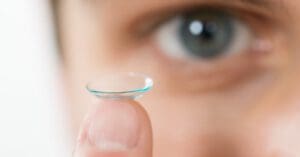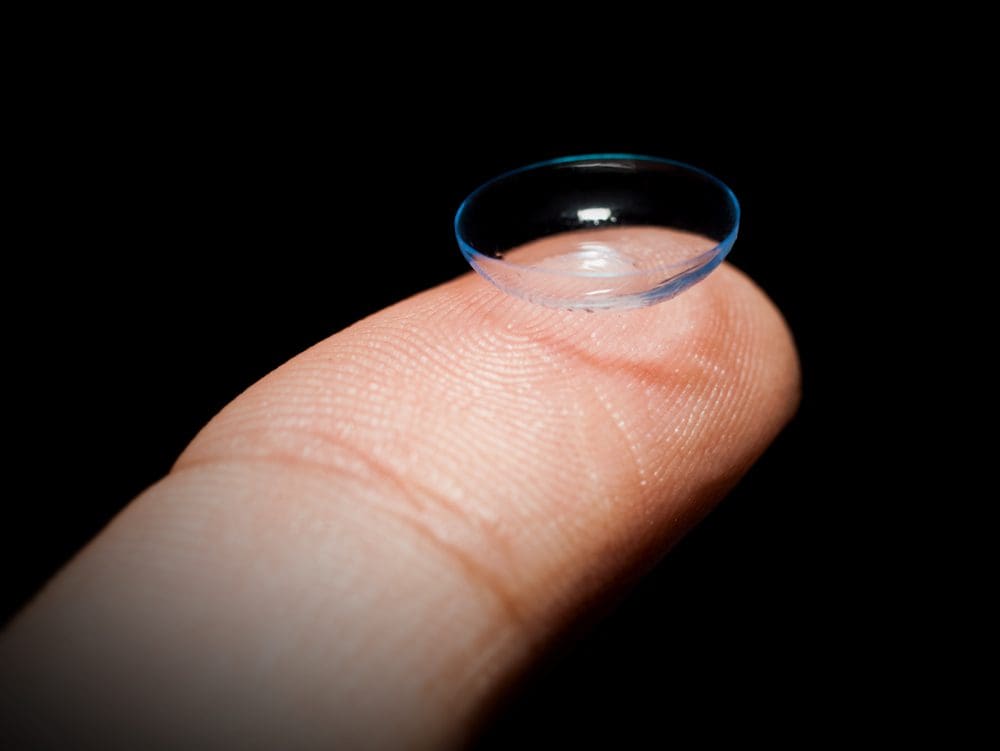Best Contact Lense for Continuous Use
Table of Contents
-
- Daily Wear
- Bi-Weekly Wear
- Extended Wear
- Rigid Gas Permeable Lenses
- Tips for Healthy Contact Lens Wear
- How Can You Make Lenses Last Longer?
- Best Brands
- Frequently Asked Questions
The packaging your contact lenses comes in should be stamped with a date that tells you when the lenses should be replaced. The length of time a lens is considered viable can vary, depending on the lens type.
Daily wear lenses are meant to be replaced daily, weekly, every two weeks, or monthly.
Extended-wear lenses are infrequently prescribed, but if you have these lenses, you will also need to replace them on a schedule the manufacturer sets.
Rigid gas permeable lenses are the winners, in terms of longevity, as they can last for a year if not longer.
You might be tempted to push the timelines and wear your lenses longer than the manufacturer recommends. This is not wise.
But there are some things you can do to ensure that your contacts last as long as they should.
Daily Wear: How Long Do They Last?
Daily wear contacts are typically made of a soft, plastic-like material that allows tears and oxygen to enter your eye. This type of contact lens is easy to adjust to, according to the American Optometric Association, but the lenses do wear out. That means the lenses must be replaced regularly.
 The frequency with which you will need to replace your lenses can vary, depending on the manufacturer of your lenses. The American Academy of Ophthalmology says some daily wear contacts are meant to be replaced each day, while others last a bit longer. Some last for a month of use.
The frequency with which you will need to replace your lenses can vary, depending on the manufacturer of your lenses. The American Academy of Ophthalmology says some daily wear contacts are meant to be replaced each day, while others last a bit longer. Some last for a month of use.
Some companies sell lenses in bulk, so you can purchase a year's supply at one time. This can help you ensure that you meet the replacement schedule deemed appropriate by the manufacturer without returning to your eye doctor repeatedly for new fittings and new lenses.
But with this form of lens, expect to make replacements monthly, if not sooner. They do not last longer than this timeframe.
Bi-Weekly: How Long Do They Last
Some wearers find the term 'bi-weekly' confusing and often get mixed up on the timings for lens replacement. Bi-weekly contacts are soft disposable lenses that should be replaced after 14 days of use (1). Sticking by the manufacturer's instructions, found on the packaging, is vital in maintaining eye health.
Although the lenses are designed to give you more convenience, you should not sleep with these types of contacts. You should remove the two-weekly disposable lenses every night and soak them in a contact lens solution to ensure optimal functionality.
If you want to alternate eyeglasses and contacts, bi-weekly lenses can still serve your needs. But remember to mark the days that you wear the contacts on your calendar. After wearing the lenses for 14 days, get rid of them. Avoid keeping used bi-weekly contacts in the case for prolonged periods.
Extended Wear: How Long Do They Last?
Among all the contact types your doctor can choose from to help you see clearly, this might be the least utilized option. According to research cited in an article published in Review of Cornea and Contact Lenses, only about 5 percent of new contact lens prescriptions are for extended wear contacts. These lenses are designed for continuous wear for up to seven days, meaning that people can sleep in them and wear them during the day.
This long use comes with some risks, including a significant risk of infection. An eye capped by a contact lens has reduced access to oxygen, and the eye can also grow dry with constant contact use. These two factors together can allow bacteria to grow between the surface of the eye and the contact. Some of these infections can threaten sight.
Often, lenses like this must be replaced monthly. If you wear the lenses at night on a regular basis, you might be encouraged to replace them even more frequently. Insurance provider VSP suggests that these lenses are safe to use as long as you are not stretching use past the manufacturer's recommended replacement date.
Again, some manufacturers sell these lenses in bulk, so you can get a year's supply when you fill your prescription. But you should expect to replace these lenses at least monthly, so a year's supply will contain quite a few contact lenses.
Rigid Gas Permeable Lenses: How Long Do They Last?

Rigid gas permeable lenses sit on the surface of the eye, just like soft contacts do, but they are made of a material that is a little stiffer and thicker. It can take time to adjust to wearing this type of contact lens, as you may feel it slip and move with each blink of your eye. You will need to keep wearing these contacts regularly or else you must start the adjustment period all over again.
Rigid lenses are made to be worn during the day. At night, they must be removed for deep cleaning. You might need to plop them in cleansers that take hours to work, or you might use heating devices that warm up the contacts to kill any pathogens.
When maintained properly, lenses like this can last for a year or longer. But you may find that it's rare to wear the same pair for a year. In a first-person account of life with hard lenses, published in Science Line, the author suggests that her lenses fell from her eyes, were torn during insertion or removal, or became entangled with debris that couldn't be removed. This author often needed to replace her lenses more frequently than the manufacturer recommended, simply because the lenses were so fragile and easy to harm.
Your doctor may be able to provide you with a quick replacement if your lenses are lost or harmed. Even if the lenses are not harmed, expect to replace them at least once per year.
Tips for Healthy Contact Lens Wear
Observing the standard of care for contact lenses is essential in maintaining healthy eyes. For healthy contacts wear, make these steps a routine:
- Remove your contacts before sleeping. Sometimes you come home too tired and taking out the contacts feels burdening. But sleeping in contact lenses puts your eyes at a greater risk of infections because of to reduced oxygen flow to the ocular tissues. Even though you can sleep in extended wear lenses, there's still a risk of infection
- Go for annual eye exams. Yearly eye check-ups ensure that you don't wear too loose or too tight contacts which usually cause problems.
- Avoid changing doctors frequently. In a bid to save, you might find yourself hopping from one optometrist to another because of the lens coupons they offer. This makes it difficult to monitor your eye health. Instead, build a good relationship with your eye doctor.
- Wear your lenses for the recommended period. Stick to the manufacturer's instruction of use. If you're using bi-weekly or monthly disposable contacts, ensure you replace them after two weeks and one month, respectively, to avoid abrasions or infections.
- Clean and disinfect lenses appropriately. Clean the case and the lenses with the contacts lens solution and not tap water. Each day, you should fill the case with a new solution.
- Seek care promptly. When you develop signs of an eye infection, like redness, pain, and blurry vision, visit an ophthalmologist or optometrist immediately to avoid the risk of further visual impairment.
How Can You Make Lenses Last Longer?
Although contacts are set to expire after a particular period, the lenses can break down before the time elapses due to improper care. Degraded contacts can hold onto allergens and foreign bodies. These can also irritate your eyes and blur your vision. For the eyewear to last the recommended duration, you should:

- Use a contact lens case for storage. Lenses can get contaminated and become unusable if not appropriately handled. To keep your contacts free of bacteria, keep used contacts in a suitable contact lens case. Don't reuse or top off contact solution sitting in the case.
- Clean with products from the same manufacturer. From cleansing to wetting, all the products you use should come from the same manufacturer as recommended by National Keratoconus Foundation. Otherwise, your lens will become cloudy due to cross-reactions of products from different companies.
- Observe proper hand hygiene when handling your lenses. Before wearing or removing your contacts, ensure you wash your hands with warm water, scrub thoroughly, and dry with a clean towel.
Best Contact Lens Brands
As a contact wearer, you might be having a favorite brand already. But if you're considering a switch or planning to have your first pair, here are the top contact lens brands to investigate:
- Acuvue
- Air Optix
- Dallas
Acuvue: Best Overall
Acuvue is the leading brand of disposable lenses globally. From daily to monthly disposable contacts, Acuvue lenses are available in multiple types to correct the different refractive errors including hyperopia, astigmatism, and nearsightedness.
The HydraLuxe and HYDRACLEAR technologies used in making these lenses keep them comfortable throughout wear.
Air Optix: Best Extended Wear
The Air Optix line of lenses features popular contacts such as AIR OPTIX for astigmatism and extended wear AIR OPTIX NIGHT & DAY AQUA. If you want a lens option that allows you to sleep in them, go for Air Optix. Their high oxygen permeability promotes healthy eyes all year round.
Dailies: Best Daily Disposable
For absolute comfort and optimal wearer experience, Dailies are the first option. Designed for individuals with active lifestyles, Dailies prevent the build-up of bacteria while correcting every kind of vision problem. Multifocal lens corrects both nearsightedness and farsightedness.
Contact Lens FAQs
-
How long do contact lenses last if they're unopened?
The package of every soft lens contains a stamp of the expiration date. Contacts remain safe as long as the packaging is not open and the expiration date is not past. If the date is past, the likelihood of contamination is high because the seal on the package will degrade.
-
How often do I change the solution?
Contact solution serves to remove bacteria and prevent lens contamination. Every night you remove the lenses, you need to keep them in a contact case with a new solution. The case itself should be cleaned at least once a month to prevent bacterial accumulation on the surface.
-
Expired lenses can predispose your eye to infections. Therefore, always ensure your prescription is current. Whether disposable or extended wear, contact lenses usually expire, and the manufacturers do indicate the dates on the package.
A soft disposable lens expires four years from the date of manufacture. When purchasing, confirm the validity to avoid stocking lenses that are about to expire.
References
Advantages and Disadvantages of Various Types of Contact Lenses. American Optometric Association.
Contact Lens Types. (September 2018). American Academy of Ophthalmology.
Extended Wear: Still an Option? (November 2017). Review of Cornea and Contact Lenses.
Glasses, Contacts, and LASIK—Contact Lenses: Know Your Options. VSP.
Why Do People Wear Hard Contact Lenses? (June 2007). Science Line.
Calculating Risk in Use of Disposable Contact Lenses. (April 2012). Canadian Medical Association Journal.
Is it Terrible to Wear the Same Contact Lenses for a Long, Long Time? (October 2018). Self.
Contamination Risk of Reusing Daily Disposable Contact Lenses. (December 2011). Optometry and Vision Science.
Rigid Contact Lenses: Do's and Don'ts. National Keratoconus Foundation.
How Long Can You Really Wear Your Contacts? (October 13, 2018) Lens. Me.
How to Take Care of Contact Lenses (March 4, 2021) American Academy of Ophthalmology.
Contact Lens Care. American Optometric Association.
All Brands. Lens.
The information provided on this page should not be used in place of information provided by a doctor or specialist. To learn more, read our Privacy Policy and Editorial Policy pages.
Source: https://www.nvisioncenters.com/contacts/how-long-last/
0 Response to "Best Contact Lense for Continuous Use"
Post a Comment